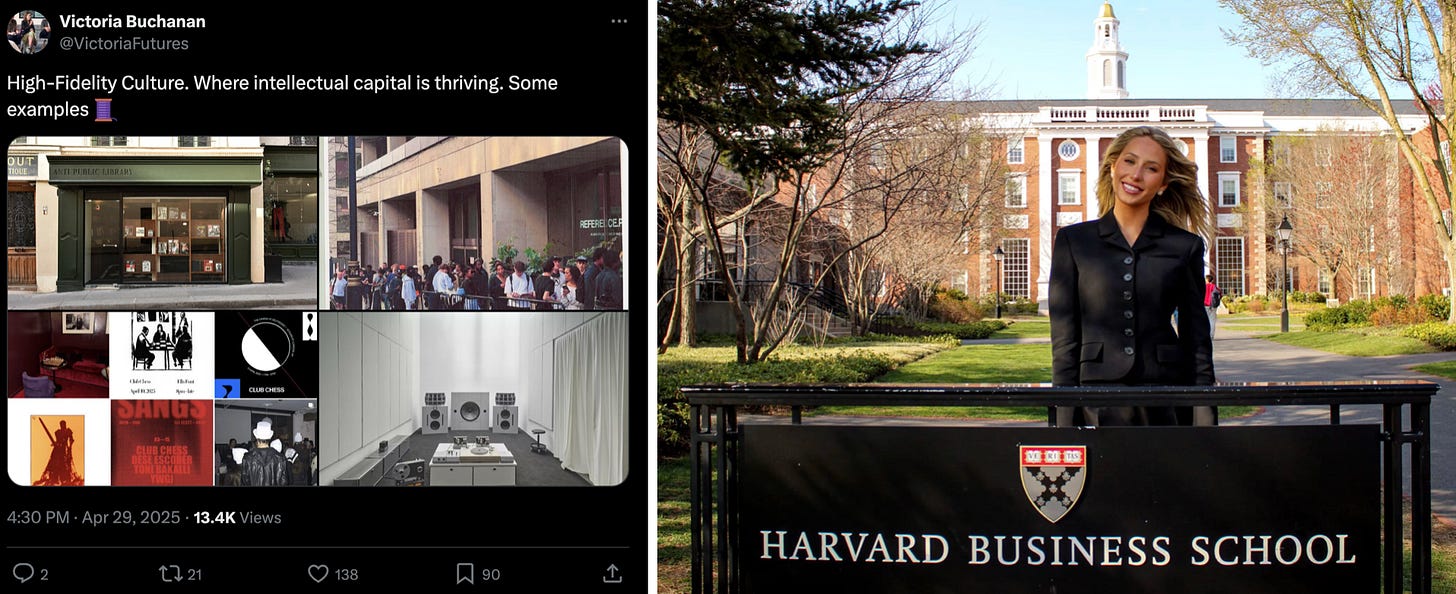Intellectualism is having a moment. Back in January, I highlighted the ‘literary revival’, encompassing branded zines, brand x book club collabs, and brand libraries, as a trend to watch for continued acceleration this year. Over the past few months, I’ve seen further developments noted by Victoria Buchanan on high-fidelity culture,
on Tiktok oracles, on celebrities chasing HBS photo ops, on the girlboss podcast boom, on the rise of the infotainer, on authors in fashion campaigns, and on wisdom signaling.1Victoria’s articulation is closer to the root of the trend: in an age of superficiality, deep knowledge of niche subjects becomes sought after. But observations from Nikita, Ochuko, Emily, and Charlotte indicate how this idea is quickly diluted: the semiotics of knowledge are used as a signaling device to create idealized Illusions of Intellect with no real depth.
This brings to life a tension I had noticed when first writing about the ‘literary revival’ but didn’t previously mention — there’s a dissonance between the aspirational portrayal of intellectual aesthetics and the worrisome data about a literacy crisis amongst young people. And more recently, I’ve been thinking a lot about how the popularity of superficially signaling knowledge intersects with the increased accessibility of AI — a powerful tool for feigning intellect. I had started drafting this post the weekend before Apple’s WWDC event and their release of a research paper investigating the limitations of artificial intelligence in complex logical reasoning, entitled The Illusion of Thinking.2
Propelled by the rapid acceleration of AI usage by the general public, Illusions of Intellect can be mapped to the Synthetic Expression macrotrend in my framework:
When I originally developed this concept, it was built out of drivers like post-truth era misinformation and metaverse hype that birthed burgeoning aesthetics blurring the boundaries of digital and analog realities, from virtual fashion and AI art to the works Ines Alpha and Tomihiro Kiro. Now, we’re witnessing the macrotrend of Synthetic Expression move beyond visual aesthetics and infiltrate research, writing, and ‘thought leadership’ to create Illusions of Intellect.
Apple’s paper focuses on the complex technological issues hindering AI’s capabilities, but these limitations should be obvious to anyone who has tried experimenting with models like ChatGPT. I have a couple of personal anecdotes of how this became apparent to me. Once, after hearing that people were using AI for astrology readings, I decided that would be fun to test out. What transpired was not exactly fun, but quite funny. ChatGPT told me I’m a Sagittarius Rising. When I replied that this was wrong, it proceeded to claim I’m a Scorpio Rising, and tried to defend why, before pivoting to suggest my ascendant is “most plausibly in Gemini or Cancer,” and blaming me by arguing that I must have provided the incorrect birth time or location. When I reconfirmed those details, it stated that my “Rising Sign is almost certainly Capricorn.” Finally, on the *sixth* attempt, it came up with the correct answer. I questioned why it had lied:
Every time I mention this issue to someone in conversation, they respond with their own unfortunate tales of AI-created misinformation. A story similar to my astrological woes was published by
earlier this month. At the Future Commerce summit last week, mentioned how testing the potential for Perplexity to aid in research for landed him with a useless list of fake links.But either a lot of people remain unaware of these issues, or they just don’t care. A couple months ago, someone tried to personalize a pitch email to me with a quote from Regressive Nostalgia…except it was not real. After wondering why I couldn’t recall my own writing, I ⌘F’d my own essay to confirm that I did not, in fact, publish the sentence “quoted” in this email (although it’s a lovely summarization of the piece).
A pitch email is fairly innocuous. What I find more worrisome is how quickly and indiscriminately people have adopted AI as a writing tool. While its pervasiveness among college students has been widely reported, I’ve seen less discussion about its broader pop cultural impact. As AI becomes the key to rapid pseudo-intellectual creation, both its repetitively circular logic and its misinformation hiccups begin to permeate culture at an unmanageable pace.
Keep reading with a 7-day free trial
Subscribe to WHAT'S ANU to keep reading this post and get 7 days of free access to the full post archives.








